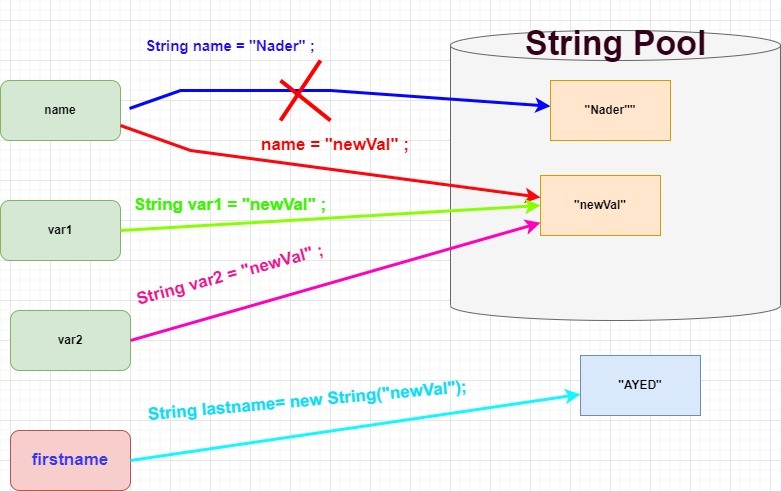What Is Immutable Strings and How It Works
In the world of programming, recognizing the concept of unalterable strings is vital for developing robust and protected applications. Unalterable strings describe strings that can not be changed after they are produced, making certain information stability and predictability within the code. This fundamental concept plays a vital duty in different programs languages and offers an one-of-a-kind strategy to managing information. By discovering the complexities of just how immutable strings function, one can uncover a globe of benefits and opportunities that can raise the top quality and effectiveness of software advancement.
The Essentials of Unalterable Strings
Unalterable strings, as a basic idea in programming, are character series that can not be transformed as soon as they are produced. This indicates that when a string is appointed a value, that value can not be changed. In languages like Python and Java, strings are immutable items, leading to numerous effects in regards to memory monitoring and information honesty.
Among the vital advantages of immutable strings is that they give a feeling of protection in information adjustment. Because the material of an immutable string can not be changed, it makes certain that the original information stays undamaged, minimizing the risk of unexpected changes throughout program implementation (Why are strings immutable in Java?). This building also streamlines debugging processes, as developers can trust that as soon as a string is specified, its worth will not be unintentionally modified
Furthermore, unalterable strings promote reliable memory usage. When a new string is developed based on an existing one, as opposed to modifying the initial string, the new value is saved individually. This method improves performance by decreasing memory fragmentation and streamlining memory allocation processes. In general, understanding the basics of unalterable strings is important for understanding programs concepts and optimizing code efficiency.
Advantages of Immutable Strings
Building upon the security and performance advantages of unalterable strings, their benefits prolong to enhancing code reliability and streamlining concurrent shows jobs. By being immutable, strings can not be customized after creation, which removes the danger of unintended changes in the information they store. This intrinsic immutability makes certain that as soon as a string is produced, its worth remains constant throughout the program's execution, decreasing the chances of insects triggered by unexpected changes.
Additionally, unalterable strings contribute to code dependability by making it easier to reason about the state of a program. Because strings can not be transformed, designers can rely on that a string will always hold the exact same value, simplifying debugging and upkeep initiatives. This predictability results in a lot more secure and trustworthy codebases.

Execution in Programming Languages
Within various shows languages, the unification of immutable strings is an essential facet that impacts just how data is handled and manipulated within code structures. The implementation of immutable strings differs across different shows languages, with each language providing its own mechanisms to sustain this principle.

In contrast, languages like C and C++ do not have integrated assistance for unalterable strings. Developers in these languages must by hand implement immutability by applying regulations within their code to prevent direct modifications to string items.
Finest Practices for Collaborating With Immutable Strings
When dealing with immutable strings in programs languages like Java and Python, sticking to ideal techniques makes certain safe and secure and effective information adjustment. One of the vital best methods is to make use of StringBuilder or StringBuffer as opposed to directly controling strings, especially when managing comprehensive concatenation procedures. These classes supply mutable choices for string adjustment, assisting to prevent unnecessary memory appropriations and enhancing performance.
One more best method is to use string interpolation or format operates supplied by the language as opposed to hands-on concatenation. This not only enhances readability yet likewise aids in stopping usual mistakes such as unintended string alterations. Furthermore, when functioning with sensitive data such as passwords or API keys, it is important to stay clear of storing them as ordinary text in unalterable strings. Using secure storage mechanisms like char ranges or specialized libraries for handling delicate info helps minimize safety and security threats connected navigate here with unalterable strings.
Real-world Applications and Instances
Exploring sensible executions of unalterable strings in different industries exposes their considerable effect on data stability and system dependability. In the medical care market, immutable strings play a crucial function in guaranteeing the protection and Read Full Report discretion of client data. By protecting against unapproved adjustments to delicate details such as clinical documents and prescriptions, unalterable strings assist preserve compliance with rigorous privacy regulations like HIPAA.
Financial organizations also benefit from the immutable nature of strings to boost the security of client data and deal documents. Unalterable strings help prevent fraudulence and unauthorized alterations to economic info, offering a robust defense versus cyber risks and making sure the trust and self-confidence of clients.

Final Thought
Finally, immutable strings are taken care of and stable series of personalities that provide benefits such as string safety and boosted performance in programs. They are implemented in numerous programs languages to ensure data stability and safety. Finest methods for working with unalterable strings include preventing direct alterations and using approaches that return brand-new string objects. Real-world applications of immutable strings consist of information security, caching, and string adjustment jobs.
Immutable strings refer to strings that can not be altered after they are produced, ensuring information honesty and predictability within the code. When a new string is developed based on an existing one, instead resource than modifying the original string, the new value is stored individually.In languages like Java and Python, strings are unalterable by default, implying that as soon as a string item is produced, its worth can not be transformed - Why are strings immutable in Java?. Finest techniques for working with unalterable strings include preventing straight adjustments and making use of methods that return brand-new string things. Real-world applications of unalterable strings consist of information file encryption, caching, and string adjustment jobs